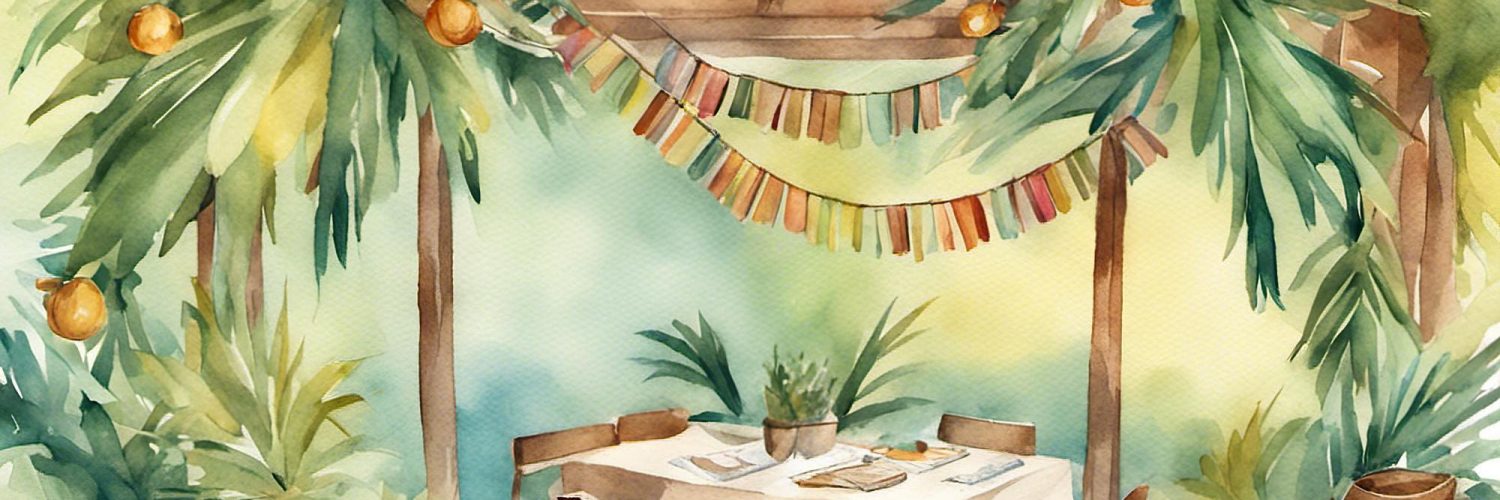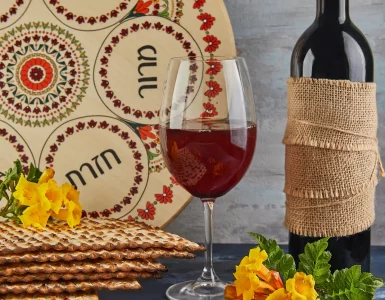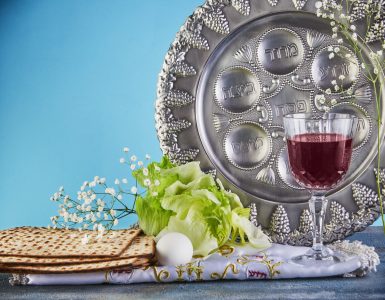The Gemara (Sukka 46a) teaches that “one who enters a Sukka recites a Bracha – Asher Kid’shanu b’Mitzvosav v’Tzivanu Leisheiv baSukka”. There is no limit to how many times one may recite this Bracha each day; one should recite it each time one “dwells” in the Sukka (Tosfos ad. loc. 45b).
The Rishonim note that although Birchos haTorah are recited only once daily even if there are multiple distinct sessions of Torah study, the Bracha of Leisheiv baSukka is recited each time one begins a distinct new session of Yeshivas Sukka. What is the reason for this distinction?
Tosfos (Brachos 11b) explain:
Torah is different, as a person does not remove it from his mind since he is obligated to learn at every moment, as the Pasuk states, “And you shall contemplate it day and night”. It is therefore as if he [studies] all day without interruption. By contrast, eating in the Sukka has a fixed time.
In other words, since time invariably passes between the end of one meal and the beginning of the next, the eating-based act of Yeshivas Sukka is interrupted each time one concludes a meal. When that happens, the previously recited Bracha expires. This is not the case with Torah study.
However, it should be noted that the reasoning offered by Tosfos is contingent on a fundamental question: Which activities constitute “dwelling” in a Sukka?
The Tur (O.C. 639) summarizes the key positions:
A person recites a Bracha on the Sukka each time he enters it. Even if he enters his friend’s Sukka to visit him, he must recite a Bracha every time. Even though he already recited a Bracha on it on the first day [of Sukkos], he continues to recite a Bracha on it. This is what the Ge’onim wrote; a person must recite a Bracha each time. Rabbenu Tam explains that since the primary [demonstration of] Kevius that a person performs in the Sukka is eating, he should recite a Bracha on eating and [thereby] exempt all other activities [from a Bracha], even sleeping – which has a stricter Halacha than eating, in that one may snack outside the Sukka but not take a nap – since eating is the primary activity, it covers everything else.
In other words, me’Ikar haDin every act of Yeshivas Sukka – be it eating, drinking, or sleeping – requires a Bracha, and theoretically one should recite this Bracha many times each day (Tosfos, Sukka, 45b, Rif, 22a, Rosh, 3:4). This is also the position of the Rambam (Hilchos Sukka, 6:12):
Each time a person enters to dwell in a Sukka – throughout the seven days – he first recites the Bracha, “Asher Kid’shanu b’Mitzvosav v’Tzivanu Leisheiv baSukka”.
However, the Maggid Mishna notes:
Nonetheless, it is customary to only recite the blessing at meals. This is per Rabbenu Yaakov’s reasoning.
The Maggid Mishna refers to the position of Rabbenu Tam, quoted above, that although any form of Yeshivas Sukka requires a Bracha, we nevertheless only recite one upon eating.
The obvious question is: Why do we limit the Bracha? Since each act of dwelling is deserving of its own Bracha, why did the custom develop that one should encompass all acts of dwelling in the few Brachos one recites each day upon eating?
Similarly, the Rishonim ask why it is customary not to recite a Bracha when sleeping in the Sukka. Sleeping is surely the most significant act of dwelling, after all, as demonstrated by the permissibility of a snack (Achilas Arai) outside a Sukka but even a short nap outside the Sukka is Asur.
Tosfos (Brachos, ibid.) answer that one should not recite a Bracha before sleeping in the Sukka since he might not fall asleep. However, Rabbenu Tam (as cited by the Rosh, ibid.) suggests:
Eating is the primary Kevius that a person performs in the Sukka, whereas spending recreational time and sleeping in the Sukka are secondary to eating – [therefore, the Bracha on eating] exempts them.
In other words, according to Rabbenu Tam, although the Halacha is stricter about sleeping than eating outside of a Sukka, nonetheless, the primary act of dwelling in a Sukka is to eat there.
The Beis Yosef notes that Rabbenu Tam’s position became widely adopted. Therefore, he rules in Shulchan Aruch (639:8), “It is customary not to recite a blessing on the Sukka except for when one is eating”. The Rema too confirms, “And this is the custom”.
Rabbenu Tam’s ruling is a great Chiddush. If a person left the Sukka and had Hesech haDa’as from it, he should be required to recite a new Bracha when he returns. Nevertheless, the Minhag is only to recite the Bracha when he next eats, following Rabbenu Tam. Likewise, a person may sit in the Sukka for an hour before eating but should only recite the Bracha when he begins his meal.
Noting this difficulty, the Mishna Berura (ibid. 46) offers a practical solution to ensure that one immediately recites a Bracha upon commencing a new act of Yeshivas Sukka:
The Acharonim wrote that it is correct to also fulfill the opinion of the early Poskim and not just sit without reciting a Bracha. Therefore, immediately upon one’s arrival from Shul, one should recite a Bracha on something consisting of the five grains[1], eat a little more than the volume of an egg (a k’Beitza), and recite the Bracha “Leisheiv baSukka”. One should not repeat the Bracha when it is time to eat.
Although most Acharonim accepted Rabbenu Tam’s ruling, the Gra is known to have sided with the Rif and the Rambam. He required a Bracha each time one commences a new session of Yeshivas Sukka.
There is a further major dispute regarding the parameters of Yeshivas Sukka: Must one do everything inside the Sukka?
Tosfos R’ Yehuda haChassid (Brachos, 11) states that one may perform recreational activities and study outside the Sukka. In his opinion, one is only required to perform one’s primary acts of dwelling (eating and sleeping) inside the Sukka. The Or Zarua (304) disagrees. He prohibits engaging in learning and recreational activities outside of the Sukka.
The Acharonim are divided over this question. The Minchas Chinuch (325), the Maharsham (1:209), and others do not require a person to do everything in the Sukka. R’ Yaakov Emden (Siddur Ya’avetz) and others (see Kaf haChaim) insist that he must. It should be noted that even those who do not mandate doing everything in the Sukka agree that one fulfills a Mitzva if he opts to do so.
In light of all of the above, let us consider if and when a Bracha should be recited in the following medical circumstances.
- May people with celiac disease ever recite the Bracha “Leisheiv baSukka” given that they are unable to eat a “k’Beitza” of Mezonos? Is there consensus amongst the Rishonim regarding this unique circumstance, or is it subject to the disagreement outlined above?
- May a patient who is exclusively tube-fed (e.g. nasogastric or gastrostomy tube) recite the Bracha “Leisheiv baSukka”?
The Poskim disagree about these questions. The Mishna Berura (ibid. 48) cites the Taz:
One who fasts on Sukkos, or intends not to eat bread on a given day, must recite a Bracha, each time [he enters the Sukka] if he genuinely left the Sukka according to all opinions. This is because those Poskim who hold that one should recite a Bracha on the primary obligation of [Yeshivas] Sukka and thereby cover all secondary activity, only do so when one eats bread. However, when one doesn’t eat, this is not applicable.
In other words, Rabbenu Tam’s ruling that one should encompass all activities of Yeshivas Sukka within the Brachos recited at mealtimes is based on the reasoning that one should include secondary acts in the Bracha that is recited on the primary act. Therefore, whenever one engages in the primary act of Yeshivas Sukka (eating), one does not recite a Bracha on other activities that precede or follow it. However, if, for whatever reason, one does not engage in the primary act, one should instead recite a Bracha on the secondary acts.
In practice, this means that a person who doesn’t eat must recite Leisheiv baSukka each time he commences a distinct session of Yeshivas Sukka, for instance, at the onset of Yom Tov and each time he returns to the Sukka having taken a significant break. He also recites the Bracha upon performing any activity that is a Mitzva to perform inside the Sukka, such as recreational activity. This is true even according to those opinions that one is not obligated to specifically perform recreational activity inside the Sukka. (Some opinions even consider a casual drink as a Mitzva of Yeshivas Sukka).
Interestingly, this ruling is not necessarily only following Rabbenu Tam. We noted that the Rishonim question Rabbenu Tam’s position. However, there are subtle differences between their questions. The Ri (in Tosfos) only questions why one would not recite a Bracha upon sleeping in the Sukka. This is why he only addresses sleeping in his answer. Rabbenu Tam himself, however, appears to be addressing a broader question: why not recite a Bracha on all types of Yeshivas Sukka? To answer that question, he explains that other acts of Yeshivas Sukka are exempted by the Bracha on eating.
Perhaps we could suggest that the Rishonim who only question why we do not recite a Bracha upon sleeping in the Sukka essentially agree to Rabbenu Tam’s principle that the Bracha on eating could exempt other forms of Yeshivas Sukka. However, they do not believe that this could apply to sleeping which has stricter Halachos, as explained above. However, other less significant acts of dwelling may be exempted.
If so, perhaps everyone would agree with the Taz’s reasoning that if a person will not be eating he must recite a Bracha on the other forms of Yeshivas Sukka. They are only exempted if one recites a Bracha on eating.
However, the position of the Taz is not unanimous. The Ma’amar Mordechai[2] disagrees and argues that, according to Rabbenu Tam, the Chachamim only instituted the Bracha of Leisheiv baSukka on eating, not on other acts of Yeshivas Sukka. Though Rabbenu Tam states that other acts are exempted by the Bracha on eating, this is only to provide the underlying reason as to why the Chachamim instituted the Bracha on eating. It does not mean that a person who is not eating should recite a Bracha on other forms of Yeshivas Sukka. One who does so may be making a Bracha l’Vatala. This is also the position of the Aruch haShulchan (ibid. 28).
The Kaf haChaim recommends that one should ask somebody who is eating to be Motzi him in the Bracha. Alternatively, he should think of the words of the Bracha without uttering them.
As far as patients with celiac disease, Rav Shlomo Zalman Auerbach zt”l (Halichos Shlomo Sukkos 9) contended that the requirement to partake of foods comprising one of the Chameshes haMinim to demonstrate Kevius is based on the fact that these are the staple foods in the diet of a person with regular nutritional requirements. Therefore, a patient with celiac disease who eats the staple foods of his diet in the Sukka must recite Leisheiv baSukka.
Rav Elyashiv (Ashrei ha’Ish 3:26:18) agrees, but for a different reason. He sides with the aforementioned ruling of the Mishna Berura and considers eating a gluten-free meal no less an act of Yeshivas Sukka than any other “secondary” activity in the Sukka.
[1] [Editor’s note: that must be eaten in the Sukka and require Birchas Mezonos or Hamotzi and Leisheiv baSukka.]
[2] R’ Mordechai Karmi zt”l (1749-1825), Rav and Dayan in Carpentras, Provence.















Add comment